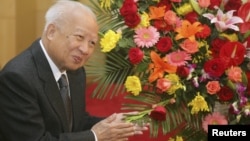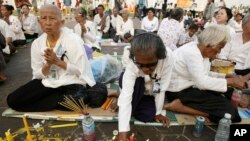The death of Cambodia’s former king, Norodom Sihanouk, has drawn high-profile condolences and memorials from top Chinese officials.
China’s foreign ministry called Sihanouk a “great friend of the Chinese people,” and on state television, Chinese officials praised ties with the former king. Several high-ranking Chinese leaders, including Vice President Xi Jinping, paid condolences to Sihanouk's widow in China's capital, where Sihanouk had been seeking medical treatment since January.
China has close political and financial ties to Cambodia, and International Relations Professor Ren Xiao of Shanghai's Fudan University said the former king was an important part of that relationship.
“When he was in difficulty, and in danger, China helped him and continued to consider him leader of Cambodia” said Ren Xiao.
Sihanouk, whose political life in Cambodia and in exile spanned almost six decades, first visited China in 1956. Chinese state media Xinhua says at that time he developed personal relationships with China's leaders, including the then premier Zhou Enlai and communist leader Mao Zedong.
In 1970, after a military coup, Sihanouk flew to Beijing, where Mao Zedong offered his alliance against the United States.
“China was opposed to the U.S. bringing war to Vietnam, and also at that time China and the U.S. were enemies in the cold war. From the political perspective we supported Sihanouk to be king, and we opposed to the government of Lon Nol,” said Ren. “Very naturally, we had a solid friendship [with Sihanouk].”
State media devoted much of their coverage Monday to the former king's death, and reported how Sihanouk thought of China as his second home.
City University International Relations Professor Mark Thompson said China is using its ties with Sihanouk, a popular father figure in Cambodia, to pursue its political goals.
“They want to associate themselves with people like Sihanouk who fascinatingly, despite all the twists and turns in his political career, has emerged relatively unscathed. He has this sort of Teflon image, that not much sticks to him in terms of what he did in the past such as for example aligning with the Khmer Rouge,” said Thompson. “By associating themselves with that they are hoping to rip some of the social capital that comes out of that.”
China and Cambodia have cultivated increasingly warm relations in recent years. In 2011 China's investment in Cambodia was more than 10 times that of the United States, and also accounted for more than double the total investment of all neighboring ASEAN countries.
On the diplomatic front, China has relied on Cambodia's support in its territorial disputes in the South China Sea. At this year's ASEAN summit, Cambodia stalled negotiations over the most recent naval stand-off between China and the Philippines, effectively siding with its northern neighbor.
China’s foreign ministry called Sihanouk a “great friend of the Chinese people,” and on state television, Chinese officials praised ties with the former king. Several high-ranking Chinese leaders, including Vice President Xi Jinping, paid condolences to Sihanouk's widow in China's capital, where Sihanouk had been seeking medical treatment since January.
Former Cambodian King Norodom Sihanouk
Former Cambodian King Norodom Sihanouk- Born in 1922, educated in Saigon and Paris
- Came to the throne in 1941
- Founded Non-Aligned Movement
- Was briefly overthrown during Vietnam War and fled to China
- Aligned with Khmer Rouge to oppose Vietnam's influence in Cambodia
- Returned from exile in 1991 and to the throne in 1993
- Abdicated to his son, Norodom Sihamoni, in 2004
- Had been receiving medical treatment in China since January, 2012
“When he was in difficulty, and in danger, China helped him and continued to consider him leader of Cambodia” said Ren Xiao.
Sihanouk, whose political life in Cambodia and in exile spanned almost six decades, first visited China in 1956. Chinese state media Xinhua says at that time he developed personal relationships with China's leaders, including the then premier Zhou Enlai and communist leader Mao Zedong.
In 1970, after a military coup, Sihanouk flew to Beijing, where Mao Zedong offered his alliance against the United States.
“China was opposed to the U.S. bringing war to Vietnam, and also at that time China and the U.S. were enemies in the cold war. From the political perspective we supported Sihanouk to be king, and we opposed to the government of Lon Nol,” said Ren. “Very naturally, we had a solid friendship [with Sihanouk].”
State media devoted much of their coverage Monday to the former king's death, and reported how Sihanouk thought of China as his second home.
City University International Relations Professor Mark Thompson said China is using its ties with Sihanouk, a popular father figure in Cambodia, to pursue its political goals.
“They want to associate themselves with people like Sihanouk who fascinatingly, despite all the twists and turns in his political career, has emerged relatively unscathed. He has this sort of Teflon image, that not much sticks to him in terms of what he did in the past such as for example aligning with the Khmer Rouge,” said Thompson. “By associating themselves with that they are hoping to rip some of the social capital that comes out of that.”
China and Cambodia have cultivated increasingly warm relations in recent years. In 2011 China's investment in Cambodia was more than 10 times that of the United States, and also accounted for more than double the total investment of all neighboring ASEAN countries.
On the diplomatic front, China has relied on Cambodia's support in its territorial disputes in the South China Sea. At this year's ASEAN summit, Cambodia stalled negotiations over the most recent naval stand-off between China and the Philippines, effectively siding with its northern neighbor.





